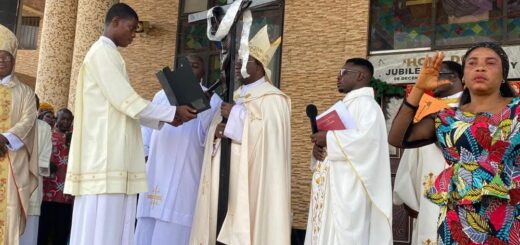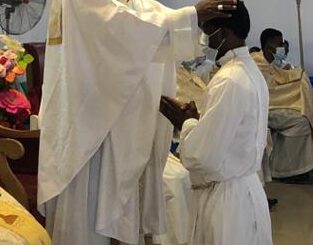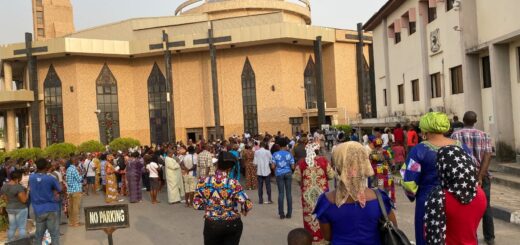Partakers in the Victory of the Resurrection of Christ
by ARCH BISHOP · April 18, 2021
Third Sunday of Easter, Year B. Homily by Archbishop I. A. Kaigama at St. Peter’s Pastoral Area, Jiwa. April 18, 2021.
Readings: Acts 3:13-15, 17-19; Ps. 4:2, 4, 7, 9; 1 Jn. 2:1-5; Lk. 24:35-48
We are still in the Easter mood and we shall remain so until the feast of Pentecost. Happy Easter to all of you in St. Peter’s Pastoral Area, Jiwa!
Easter makes us sharers in the victory brought to us by the resurrection of Christ; it emboldens us and sustains our hope even in the midst of tough challenges, whether spiritual, social, political or otherwise.
According to St. Paul, if Christ did not rise from the dead, our Christian faith would be in vain (cf. 1 Cor. 15:14). We have overwhelming historical evidence that Jesus died and rose. The empty tomb, the testimony of Mary Magdalene, the guards, Peter and John who saw that the body of Jesus was no longer in the tomb, Cleopas and his friend on the road to Emmaus who encountered the risen Lord, Thomas who saw the marks of His crucifixion, the eleven Apostles and their companions gathered in Jerusalem before whom the risen Lord ate a piece of grilled fish are more than enough proofs.
On the strength of the resurrection, St. Paul reminds us to look for things that are above in heaven (Cf. Col. 3:2). We must however avoid the extremes of “this worldliness” and the “other worldliness”. It is easy to devote an enormous amount of energy to acquire worldly things, but when we die, we leave our earthly possessions to others who may squander them recklessly. In some cultures some people bury their dead ones with lots of money, jewelleries or in very expensive vehicles. All these mean nothing because after death only the soul matters. The other extreme is demonstrated by those who show a very casual or even no interest in worldly or contemporary social issues. Such people are so lost in heavenly or mystical concerns that they ignore what needs to be done to improve society. This is escapism, which I believe the Pastoral Constitution on the Church in the Modern World (Gaudium et Spes #1), advises against, by saying that the joys and the hopes, the griefs and anxieties, of the men and women of this age, especially those who are poor or in any way afflicted should be our concern. Pope Benedict in Deus Caritas Est says, the Church cannot and must not remain on the sidelines in the fight for justice” or the demands of the common good (28a).
Unlike the Scribes and Pharisees who denied the resurrection of Jesus, we believe that it was God’s plan for Christ to suffer and die and be raised. It is not enough however to know about the resurrection, but as St. Paul says in Philippians 3:10, we must share in its power. In the first reading, St. Peter stresses that we must repent from our sins and live in obedience to God’s commandments. Our sins must be wiped out (cf. Acts 3:19), otherwise, we make ourselves liars before God and the world. Sin should no longer dominate our lives because we have been baptized into Christ and we are new creatures.
The Gospel mentions the two very sad disciples on the way to Emmaus. Today, our collective and individual experiences in Nigeria have forced especially some of our youth to embark on a sad journey to “Emmaus” in the Diaspora, with the hope of finding greener pastures; driven away from where they call home by an inhospitable social environment of corrupt governance, which robs them of their rights and privileges, as well as a high insecurity as manifested in the daily killings, kidnappings, etc.
Like the disciples of Emmaus, who said “we had hoped…” (Lk. 24:21), our youths had hoped for a better country, a nation meeting their material and social needs, but their hopes seem to be dashed by poor governance and the insensitivity of leaders to issues of equity and merit. Since independence, successive democratic and military leaders kept promising poverty alleviation by improving socio-economic conditions, but after over sixty years, we are not only still poor, but terribly unsafe. Even before 2023 comes, expensive strategizing and campaigns about who should be President, or Governors or Senators have kick-started in earnest, while strategies to improve the welfare of over two hundred million Nigerians are in the back burner. Some are prepared to pitch the two dominant religions in Nigeria against each other or the North against the South.
Many Nigerians in the face of poverty and social deprivation understandably feel deserted and betrayed by Government and have become apathetic or cynical to social or political issues.
Our consolation is that Jesus still walks with His disciples as He did on the way to Emmaus. To all Nigerians, we say, once there is life, there is hope. The best will come someday, somehow, by the grace of God, to supersede the current seemingly hopeless situation.
Christians must keep “talking about Jesus” and to Jesus. Unfortunately, many Christians today faced with material difficulties no longer talk about or with Jesus, but instead talk about miracles and prosperity, encouraged by greedy preachers who capitalize on the people’s poor socio-economic conditions. In most families, very little time is given to the things of God as is given to socials. At home, almost everyone is fixated on their cell phones or computers, completely lost in the social media, oblivious of family members in the same room or even at meals. We rarely “talk about Jesus” in social gatherings or social media platforms, because we are ashamed that people may tag us “religious”. We must however realize that it is only when we talk often about Jesus and with Jesus that He can appear to us and accompany us as He did to the disciples on the road to Emmaus. As He was victorious over sin and death, so will He help us to victory in our spiritual and social challenges.




